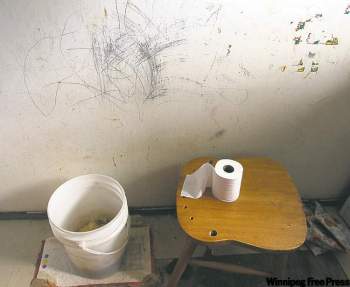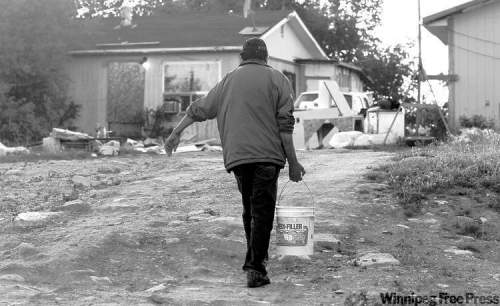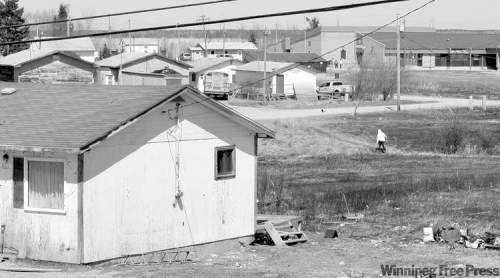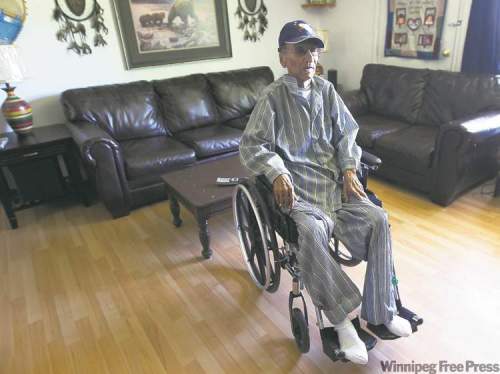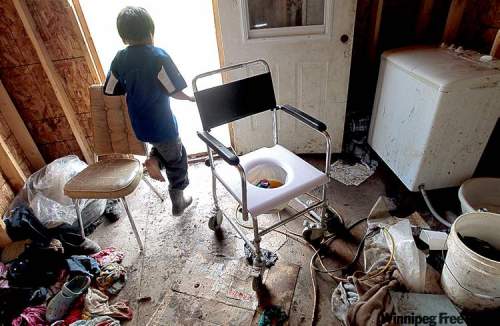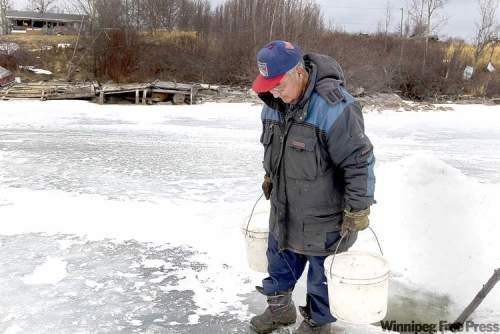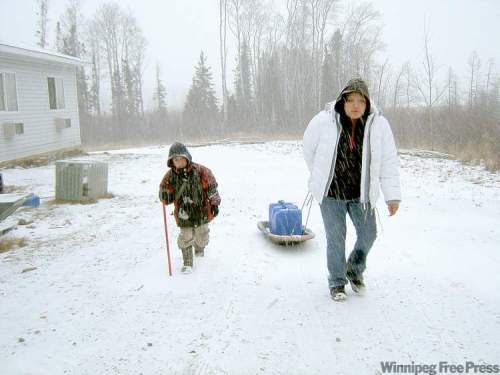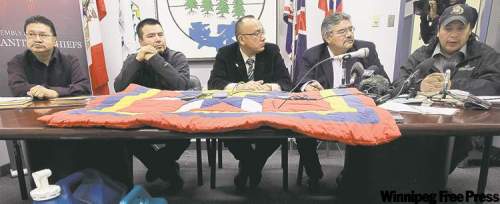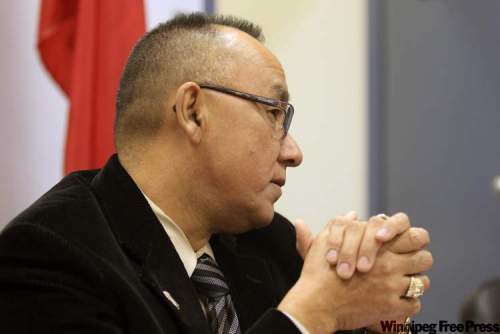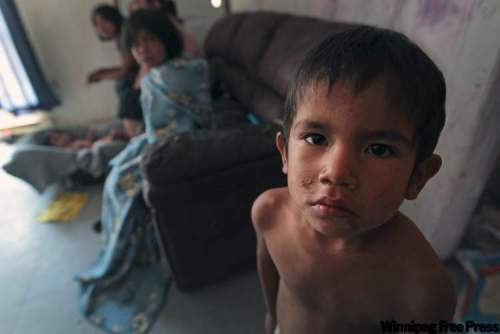Working for Change
Price tag for running water, toilets $29M
5 minute read Tuesday, Dec. 20, 2011It would cost $29 million -- about one-tenth the price of Winnipeg's new state-of-the-art water treatment plant -- to provide running water and flush toilets to thousands of northern Manitobans living in Third World conditions.
A just-completed community assessment by the Island Lake Tribal Council reports there are about 950 homes on the region's four remote reserves where residents use slop pails or latrines instead of modern toilets.
The figure is starker than the original estimate, which pegged the number at about 800.
More than 1,000 homes need renovations to rough-in plumbing and install taps and toilets in rudimentary washrooms where slop pails and basins now sit. Or, the houses need new additions built to accommodate sinks, tubs and toilets. Most of those homes also need electrical upgrades to run a hot water tank.
Advertisement
Weather
Winnipeg MB
-10°C, Cloudy with wind
Feds, province agree to bring running water to Island Lake
3 minute read Saturday, Dec. 17, 2011OTTAWA -- The provincial and federal governments agreed Friday to a joint program to give running water to homes in the Island Lake region of Manitoba.
However, there is still no dollar figure attached nor a timeline for completing the project.
Manitoba Aboriginal Affairs Minister Eric Robinson and federal Aboriginal Affairs Minister John Duncan met in Ottawa on Friday, mainly to discuss the Island Lake water crisis and hammer out a plan to fix it together.
"It was one of the most productive meetings I have had with the federal government in a long time," said Robinson.
Ottawa pledges funding to Island Lake
4 minute read Preview Friday, Dec. 16, 2011Public shock, anger over issue evaporate
5 minute read Saturday, Nov. 5, 2011WHERE’S the outrage?
It’s been a year since the Winnipeg Free Press first highlighted the damage to health and human dignity caused by the lack of running water in 1,400 First Nations homes. The series of stories spawned hundreds of emails, online comments and letters to the editor, many asking what action average people could take to solve the problem.
But since then, a small handful of advocacy campaigns have largely failed to galvanize public opinion, few charitable organizations have stepped up to tackle the problem and the federal government is under no sustained pressure to provide essential services to First Nations mired in Third World conditions
“All that energy and public attention just dissipated,” said Laurel Gardiner, director of the Manitoba office of the Frontiers Foundation, an aboriginal charitable agency that’s piloting a home retrofit program in Island Lake.
Dutch device may fix water problems
4 minute read Preview Saturday, Nov. 5, 2011Lottery for a life
7 minute read Preview Saturday, Nov. 5, 2011First Nations to alert UN to water woes
3 minute read Preview Wednesday, Feb. 16, 2011Share the wealth, grand chief says
4 minute read Monday, Jan. 17, 2011The people of Island Lake are not asking for handouts to help get running water into their homes, Northern Manitoba Grand Chief David Harper told a public meeting organized Friday night to explore whether the Mennonite Central Committee could help.
"In Manitoba alone, $3 billion is extracted every year from our lands, waters, our natural resources. All we're asking is to share the wealth, to go back to the treaties... We simply are asking the general public, the government, to acknowledge that there is a covenant."
Peter Rempel, executive director of the Mennonite Central Committee that organized the Just Water event, said after the meeting that the concept of a sacred covenant "really resonates with Christians."
"The people who signed the treaties on behalf of the Canadian government, I think, must have signed them out of some sense of understanding that this was also under God."
A Manitoba solution?
4 minute read Preview Friday, Dec. 17, 2010Northern chiefs want water
3 minute read Preview Thursday, Dec. 16, 2010Aboriginal leaders call for action on running water
2 minute read Wednesday, Dec. 15, 2010OTTAWA -- Northern Manitoba aboriginal leaders were in Ottawa this morning demanding the federal government put in place a plan to have clean running water in every northern reserve within two years.
Manitoba Keewatinowi Okimakanak Grand Chief David Harper said the lack of running water in as many as 1,000 homes “jeopardizes everyone.”
“Whenever there is a crisis in any part of the world Canada jumps,” said Harper.
He estimates it would cost $60 million to retrofit the homes with the plumbing and fixtures necessary to support running water and install water holding tanks.
Manitoba formally seeks help to build permanent road
3 minute read Thursday, Nov. 18, 2010OTTAWA -- The Manitoba government formally asked Ottawa Wednesday for help to expedite construction of an all-weather road into Island Lake.
Manitoba Aboriginal Affairs Minister Eric Robinson met with federal Indian Affairs Minister John Duncan on Parliament Hill, in part to ask Ottawa to partner on building a permanent road to the four Island Lake communities.
At the same time, Ernie Gilroy, head of the East Side Road Authority, met with bureaucrats from the federal department of infrastructure to discuss the project, which includes roads to other communities east of Lake Winnipeg.
Robinson said he is encouraged by the meetings. "The minister and I have agreed the east-side road has got to be put on the radar screen of the federal government."
Glover to meet Island Lake chiefs
4 minute read Wednesday, Nov. 17, 2010The federal government is sending Indian Affairs parliamentary secretary Shelly Glover to meet with Island Lake chiefs this weekend to discuss what can be done to address the lack of basic services in the impoverished Manitoba region.
St. Theresa Point Chief David McDougall confirmed Tuesday the meeting he requested in a Nov. 10 letter was granted.
"We want to discuss the options and what can happen to address some of the immediate concerns," said McDougall, who chairs the Island Lake Tribal Council.
He believes the government is listening after a series of Free Press stories drew attention to the health problems caused by lack of running water in hundreds of the area's homes.
Chiefs push for road in north
4 minute read Preview Tuesday, Nov. 16, 2010VIDEO: Chiefs address running-water issue
2 minute read Preview Monday, Nov. 15, 2010Do upgrades now, most in poll say
5 minute read Preview Saturday, Nov. 6, 2010LOAD MORE


